Analysis of Various Research Papers and Articles
VerifiedAdded on 2020/10/05
|16
|4916
|223
AI Summary
The provided document presents a compilation of research papers and articles from diverse fields, including energy management, micro-grid operations, water productivity, agriculture, and medical practices. The summary section provides specific details about the assignment, which involves analyzing and describing various research studies. Each article or paper is accompanied by its respective title, authors, publication year, and sometimes a brief description of the content. The compilation covers topics such as energy management systems, micro-grid participation in demand response, RFID-based attendance management, and more. It serves as a resource for students looking to gain insights into these fields through research papers and articles.
Contribute Materials
Your contribution can guide someone’s learning journey. Share your
documents today.
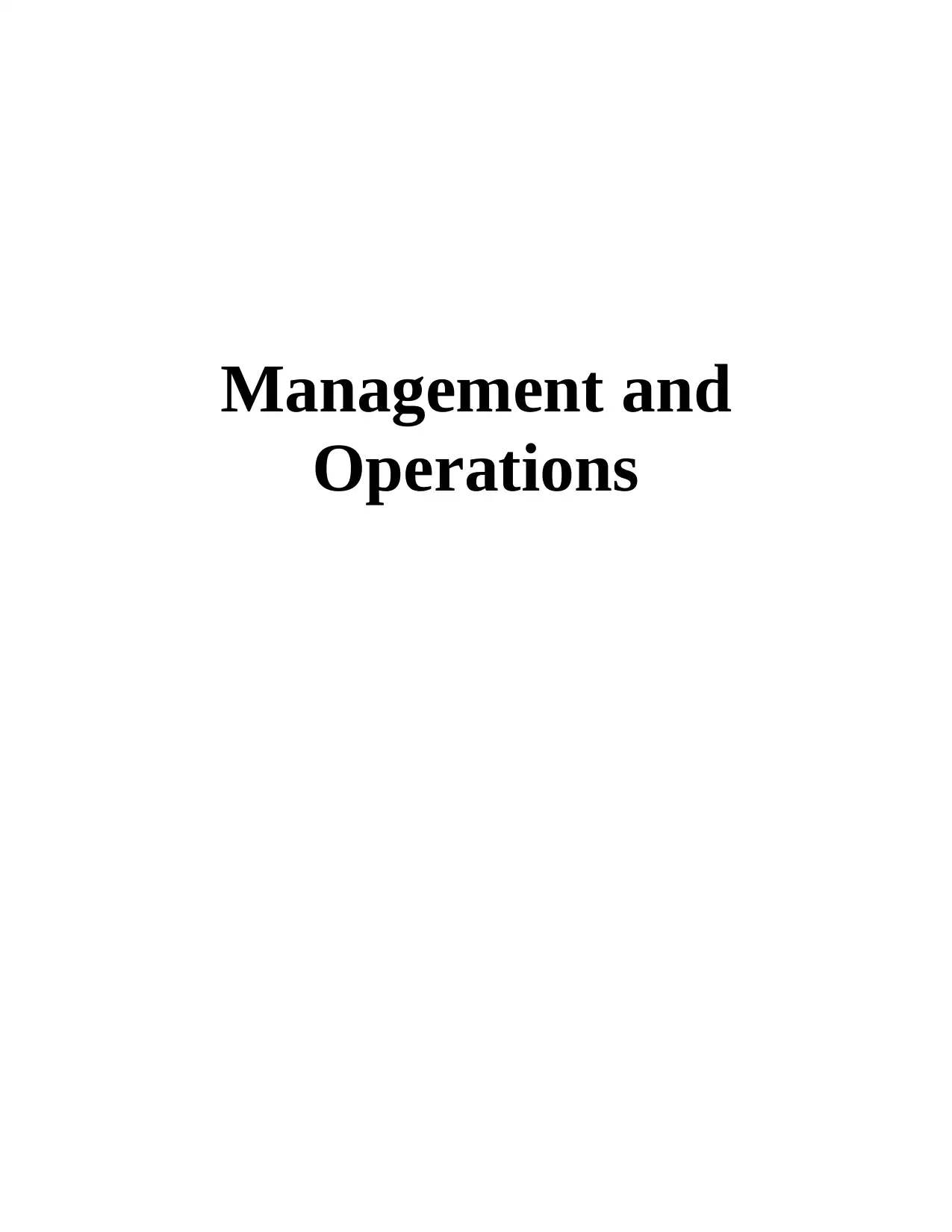
Management and
Operations
Operations
Secure Best Marks with AI Grader
Need help grading? Try our AI Grader for instant feedback on your assignments.
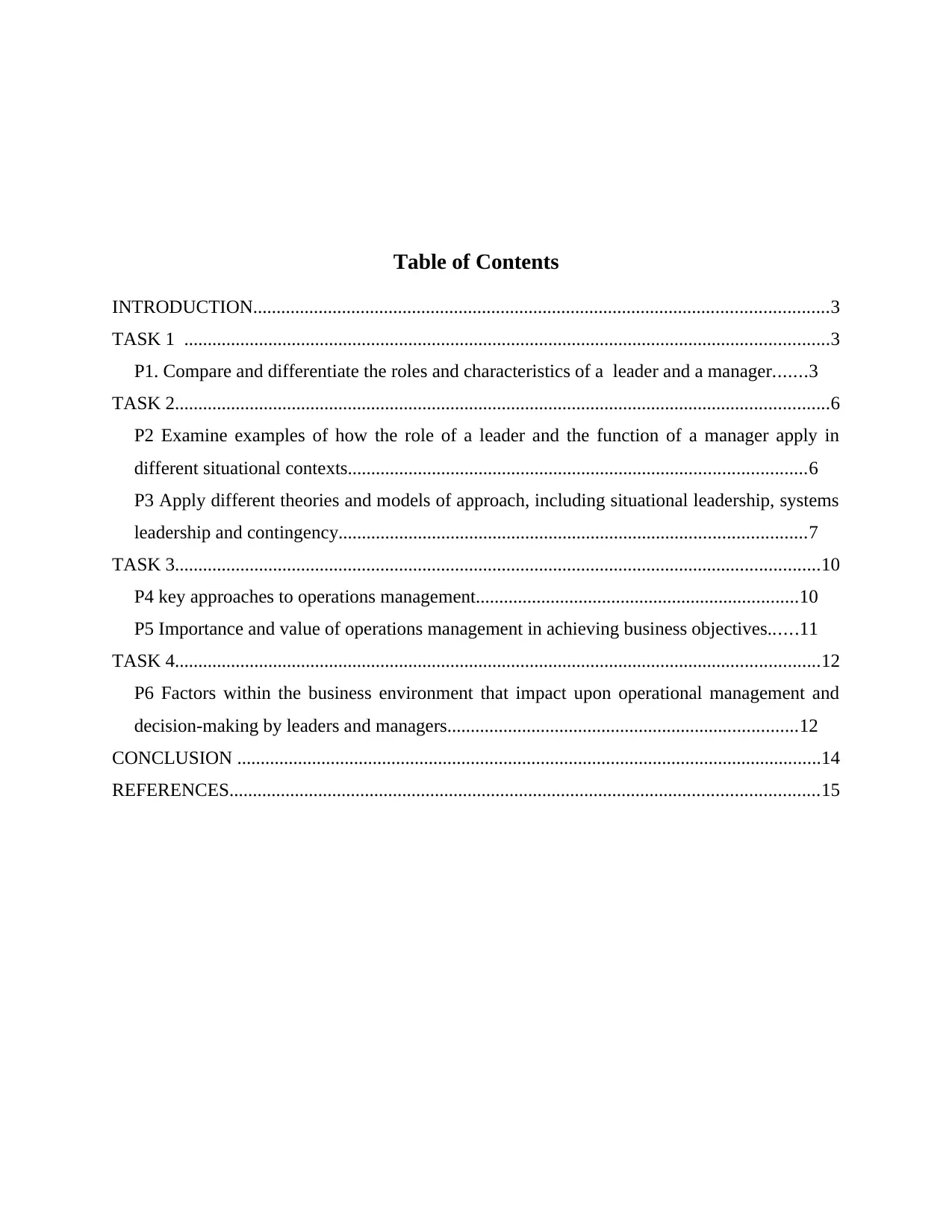
Table of Contents
INTRODUCTION...........................................................................................................................3
TASK 1 ..........................................................................................................................................3
P1. Compare and differentiate the roles and characteristics of a leader and a manager.......3
TASK 2............................................................................................................................................6
P2 Examine examples of how the role of a leader and the function of a manager apply in
different situational contexts..................................................................................................6
P3 Apply different theories and models of approach, including situational leadership, systems
leadership and contingency....................................................................................................7
TASK 3..........................................................................................................................................10
P4 key approaches to operations management.....................................................................10
P5 Importance and value of operations management in achieving business objectives......11
TASK 4..........................................................................................................................................12
P6 Factors within the business environment that impact upon operational management and
decision-making by leaders and managers...........................................................................12
CONCLUSION .............................................................................................................................14
REFERENCES..............................................................................................................................15
INTRODUCTION...........................................................................................................................3
TASK 1 ..........................................................................................................................................3
P1. Compare and differentiate the roles and characteristics of a leader and a manager.......3
TASK 2............................................................................................................................................6
P2 Examine examples of how the role of a leader and the function of a manager apply in
different situational contexts..................................................................................................6
P3 Apply different theories and models of approach, including situational leadership, systems
leadership and contingency....................................................................................................7
TASK 3..........................................................................................................................................10
P4 key approaches to operations management.....................................................................10
P5 Importance and value of operations management in achieving business objectives......11
TASK 4..........................................................................................................................................12
P6 Factors within the business environment that impact upon operational management and
decision-making by leaders and managers...........................................................................12
CONCLUSION .............................................................................................................................14
REFERENCES..............................................................................................................................15
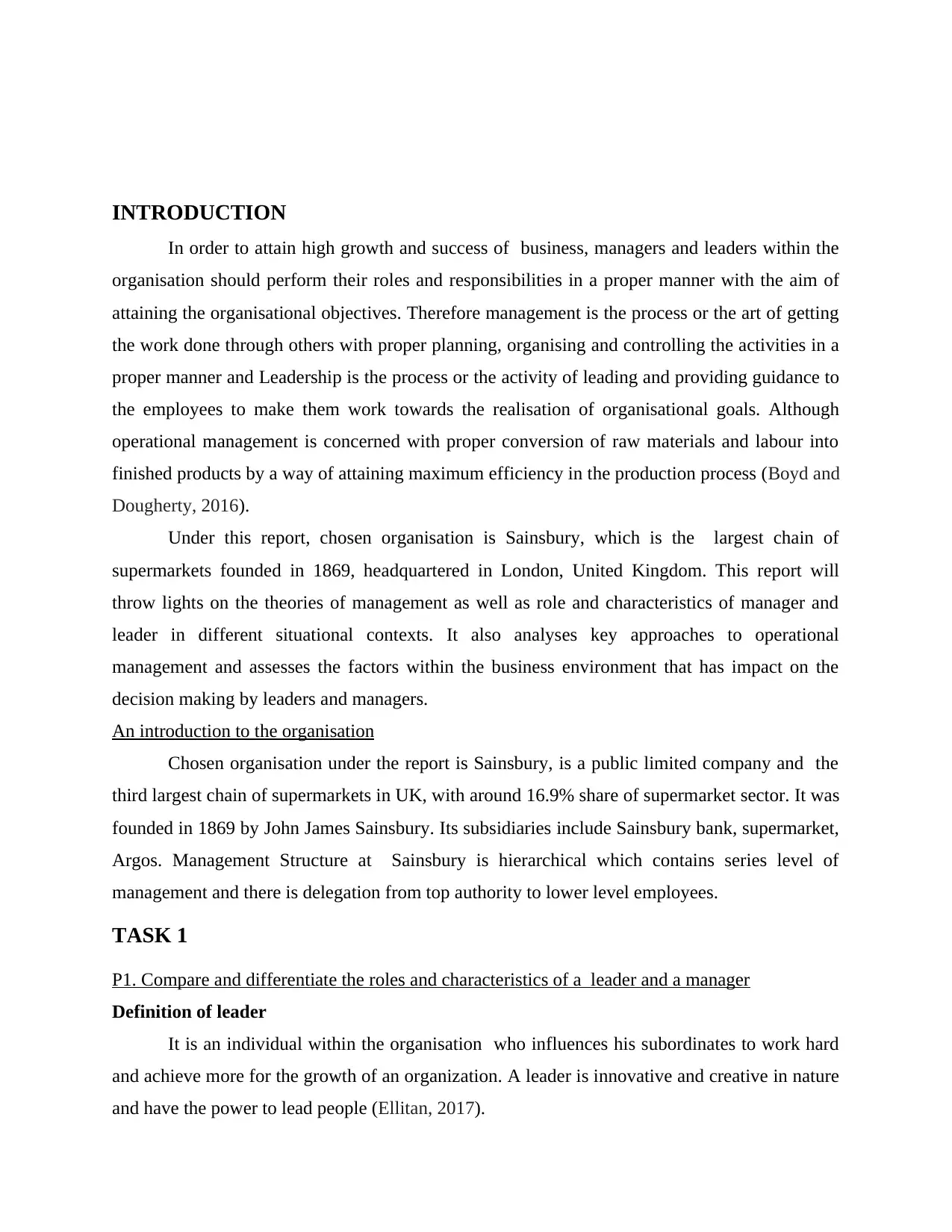
INTRODUCTION
In order to attain high growth and success of business, managers and leaders within the
organisation should perform their roles and responsibilities in a proper manner with the aim of
attaining the organisational objectives. Therefore management is the process or the art of getting
the work done through others with proper planning, organising and controlling the activities in a
proper manner and Leadership is the process or the activity of leading and providing guidance to
the employees to make them work towards the realisation of organisational goals. Although
operational management is concerned with proper conversion of raw materials and labour into
finished products by a way of attaining maximum efficiency in the production process (Boyd and
Dougherty, 2016).
Under this report, chosen organisation is Sainsbury, which is the largest chain of
supermarkets founded in 1869, headquartered in London, United Kingdom. This report will
throw lights on the theories of management as well as role and characteristics of manager and
leader in different situational contexts. It also analyses key approaches to operational
management and assesses the factors within the business environment that has impact on the
decision making by leaders and managers.
An introduction to the organisation
Chosen organisation under the report is Sainsbury, is a public limited company and the
third largest chain of supermarkets in UK, with around 16.9% share of supermarket sector. It was
founded in 1869 by John James Sainsbury. Its subsidiaries include Sainsbury bank, supermarket,
Argos. Management Structure at Sainsbury is hierarchical which contains series level of
management and there is delegation from top authority to lower level employees.
TASK 1
P1. Compare and differentiate the roles and characteristics of a leader and a manager
Definition of leader
It is an individual within the organisation who influences his subordinates to work hard
and achieve more for the growth of an organization. A leader is innovative and creative in nature
and have the power to lead people (Ellitan, 2017).
In order to attain high growth and success of business, managers and leaders within the
organisation should perform their roles and responsibilities in a proper manner with the aim of
attaining the organisational objectives. Therefore management is the process or the art of getting
the work done through others with proper planning, organising and controlling the activities in a
proper manner and Leadership is the process or the activity of leading and providing guidance to
the employees to make them work towards the realisation of organisational goals. Although
operational management is concerned with proper conversion of raw materials and labour into
finished products by a way of attaining maximum efficiency in the production process (Boyd and
Dougherty, 2016).
Under this report, chosen organisation is Sainsbury, which is the largest chain of
supermarkets founded in 1869, headquartered in London, United Kingdom. This report will
throw lights on the theories of management as well as role and characteristics of manager and
leader in different situational contexts. It also analyses key approaches to operational
management and assesses the factors within the business environment that has impact on the
decision making by leaders and managers.
An introduction to the organisation
Chosen organisation under the report is Sainsbury, is a public limited company and the
third largest chain of supermarkets in UK, with around 16.9% share of supermarket sector. It was
founded in 1869 by John James Sainsbury. Its subsidiaries include Sainsbury bank, supermarket,
Argos. Management Structure at Sainsbury is hierarchical which contains series level of
management and there is delegation from top authority to lower level employees.
TASK 1
P1. Compare and differentiate the roles and characteristics of a leader and a manager
Definition of leader
It is an individual within the organisation who influences his subordinates to work hard
and achieve more for the growth of an organization. A leader is innovative and creative in nature
and have the power to lead people (Ellitan, 2017).
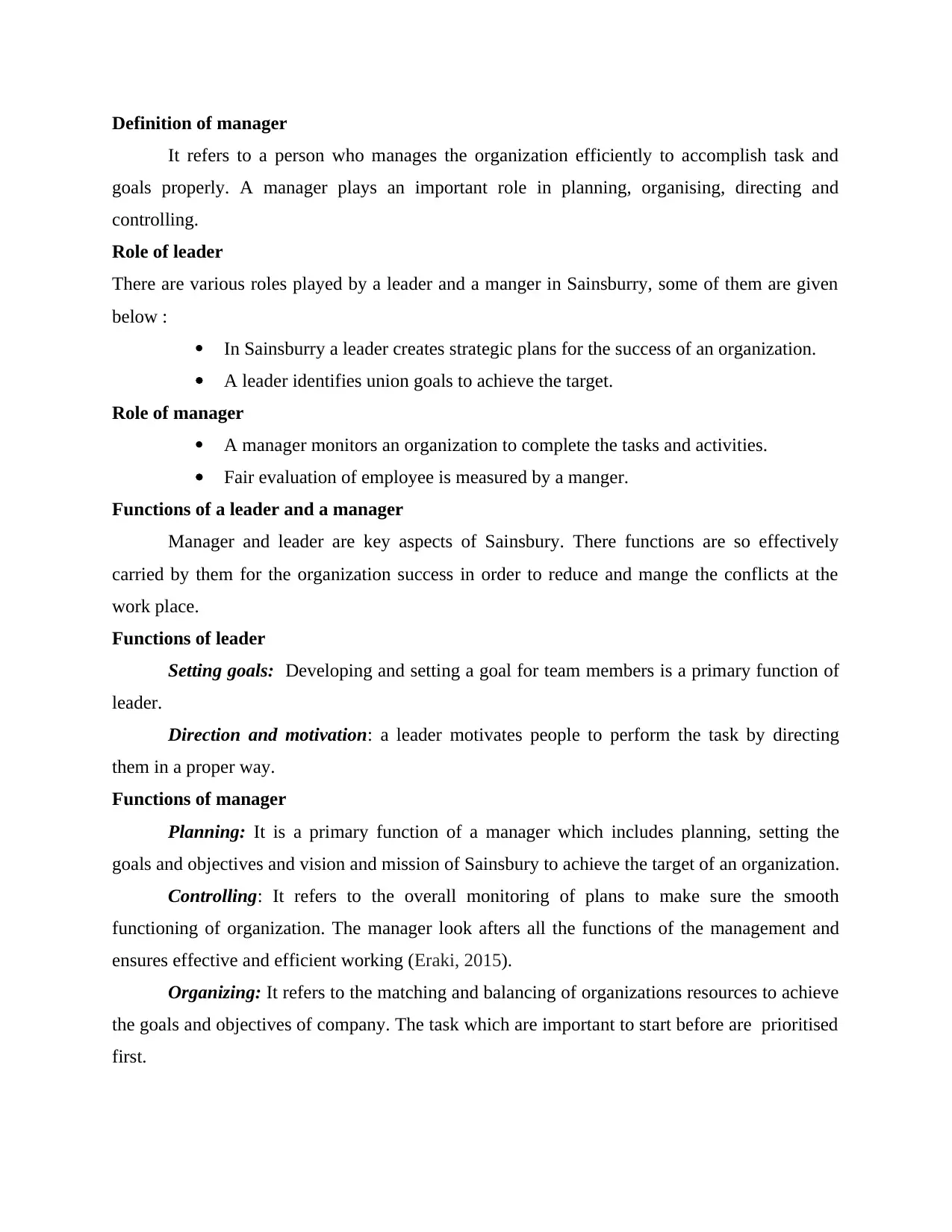
Definition of manager
It refers to a person who manages the organization efficiently to accomplish task and
goals properly. A manager plays an important role in planning, organising, directing and
controlling.
Role of leader
There are various roles played by a leader and a manger in Sainsburry, some of them are given
below :
In Sainsburry a leader creates strategic plans for the success of an organization.
A leader identifies union goals to achieve the target.
Role of manager
A manager monitors an organization to complete the tasks and activities.
Fair evaluation of employee is measured by a manger.
Functions of a leader and a manager
Manager and leader are key aspects of Sainsbury. There functions are so effectively
carried by them for the organization success in order to reduce and mange the conflicts at the
work place.
Functions of leader
Setting goals: Developing and setting a goal for team members is a primary function of
leader.
Direction and motivation: a leader motivates people to perform the task by directing
them in a proper way.
Functions of manager
Planning: It is a primary function of a manager which includes planning, setting the
goals and objectives and vision and mission of Sainsbury to achieve the target of an organization.
Controlling: It refers to the overall monitoring of plans to make sure the smooth
functioning of organization. The manager look afters all the functions of the management and
ensures effective and efficient working (Eraki, 2015).
Organizing: It refers to the matching and balancing of organizations resources to achieve
the goals and objectives of company. The task which are important to start before are prioritised
first.
It refers to a person who manages the organization efficiently to accomplish task and
goals properly. A manager plays an important role in planning, organising, directing and
controlling.
Role of leader
There are various roles played by a leader and a manger in Sainsburry, some of them are given
below :
In Sainsburry a leader creates strategic plans for the success of an organization.
A leader identifies union goals to achieve the target.
Role of manager
A manager monitors an organization to complete the tasks and activities.
Fair evaluation of employee is measured by a manger.
Functions of a leader and a manager
Manager and leader are key aspects of Sainsbury. There functions are so effectively
carried by them for the organization success in order to reduce and mange the conflicts at the
work place.
Functions of leader
Setting goals: Developing and setting a goal for team members is a primary function of
leader.
Direction and motivation: a leader motivates people to perform the task by directing
them in a proper way.
Functions of manager
Planning: It is a primary function of a manager which includes planning, setting the
goals and objectives and vision and mission of Sainsbury to achieve the target of an organization.
Controlling: It refers to the overall monitoring of plans to make sure the smooth
functioning of organization. The manager look afters all the functions of the management and
ensures effective and efficient working (Eraki, 2015).
Organizing: It refers to the matching and balancing of organizations resources to achieve
the goals and objectives of company. The task which are important to start before are prioritised
first.
Secure Best Marks with AI Grader
Need help grading? Try our AI Grader for instant feedback on your assignments.
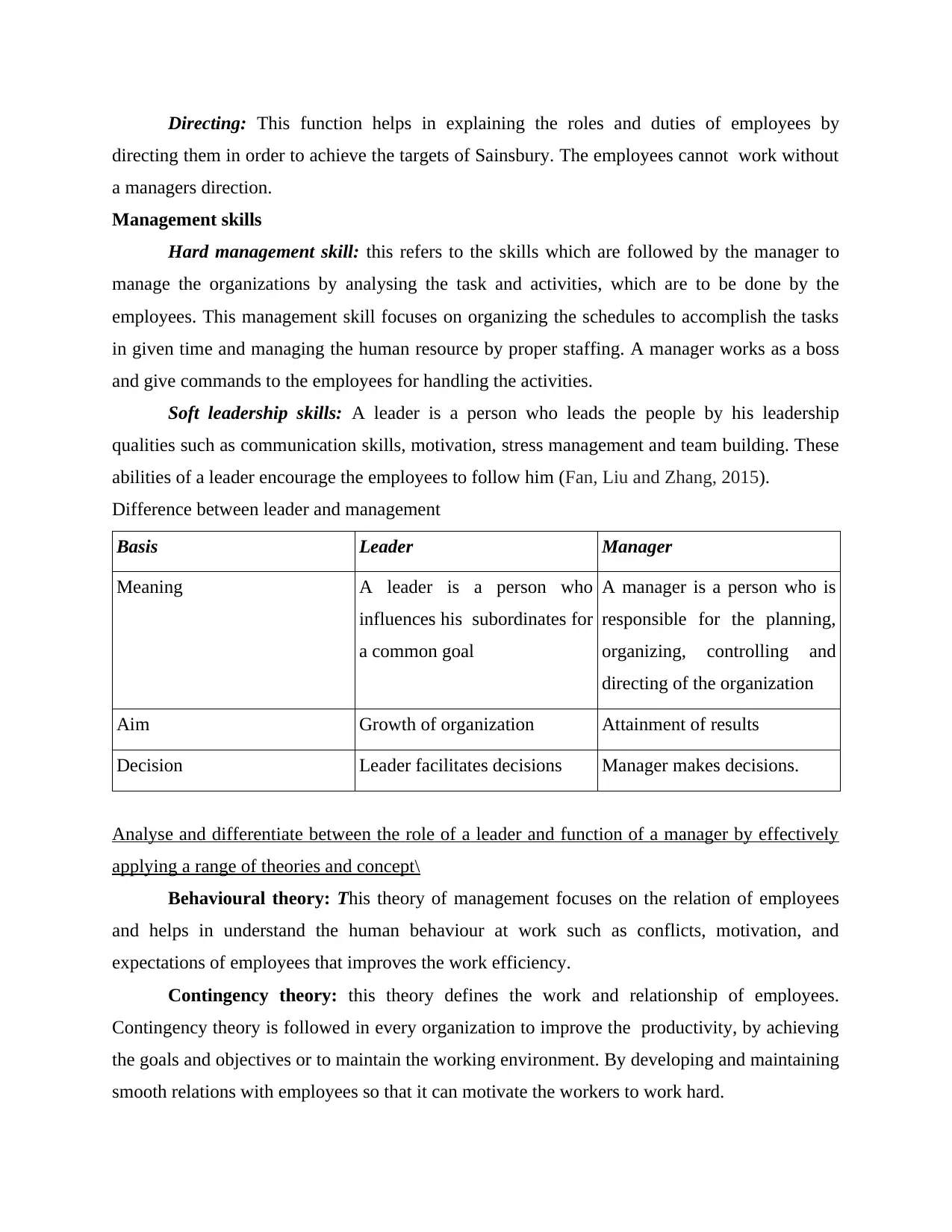
Directing: This function helps in explaining the roles and duties of employees by
directing them in order to achieve the targets of Sainsbury. The employees cannot work without
a managers direction.
Management skills
Hard management skill: this refers to the skills which are followed by the manager to
manage the organizations by analysing the task and activities, which are to be done by the
employees. This management skill focuses on organizing the schedules to accomplish the tasks
in given time and managing the human resource by proper staffing. A manager works as a boss
and give commands to the employees for handling the activities.
Soft leadership skills: A leader is a person who leads the people by his leadership
qualities such as communication skills, motivation, stress management and team building. These
abilities of a leader encourage the employees to follow him (Fan, Liu and Zhang, 2015).
Difference between leader and management
Basis Leader Manager
Meaning A leader is a person who
influences his subordinates for
a common goal
A manager is a person who is
responsible for the planning,
organizing, controlling and
directing of the organization
Aim Growth of organization Attainment of results
Decision Leader facilitates decisions Manager makes decisions.
Analyse and differentiate between the role of a leader and function of a manager by effectively
applying a range of theories and concept\
Behavioural theory: This theory of management focuses on the relation of employees
and helps in understand the human behaviour at work such as conflicts, motivation, and
expectations of employees that improves the work efficiency.
Contingency theory: this theory defines the work and relationship of employees.
Contingency theory is followed in every organization to improve the productivity, by achieving
the goals and objectives or to maintain the working environment. By developing and maintaining
smooth relations with employees so that it can motivate the workers to work hard.
directing them in order to achieve the targets of Sainsbury. The employees cannot work without
a managers direction.
Management skills
Hard management skill: this refers to the skills which are followed by the manager to
manage the organizations by analysing the task and activities, which are to be done by the
employees. This management skill focuses on organizing the schedules to accomplish the tasks
in given time and managing the human resource by proper staffing. A manager works as a boss
and give commands to the employees for handling the activities.
Soft leadership skills: A leader is a person who leads the people by his leadership
qualities such as communication skills, motivation, stress management and team building. These
abilities of a leader encourage the employees to follow him (Fan, Liu and Zhang, 2015).
Difference between leader and management
Basis Leader Manager
Meaning A leader is a person who
influences his subordinates for
a common goal
A manager is a person who is
responsible for the planning,
organizing, controlling and
directing of the organization
Aim Growth of organization Attainment of results
Decision Leader facilitates decisions Manager makes decisions.
Analyse and differentiate between the role of a leader and function of a manager by effectively
applying a range of theories and concept\
Behavioural theory: This theory of management focuses on the relation of employees
and helps in understand the human behaviour at work such as conflicts, motivation, and
expectations of employees that improves the work efficiency.
Contingency theory: this theory defines the work and relationship of employees.
Contingency theory is followed in every organization to improve the productivity, by achieving
the goals and objectives or to maintain the working environment. By developing and maintaining
smooth relations with employees so that it can motivate the workers to work hard.
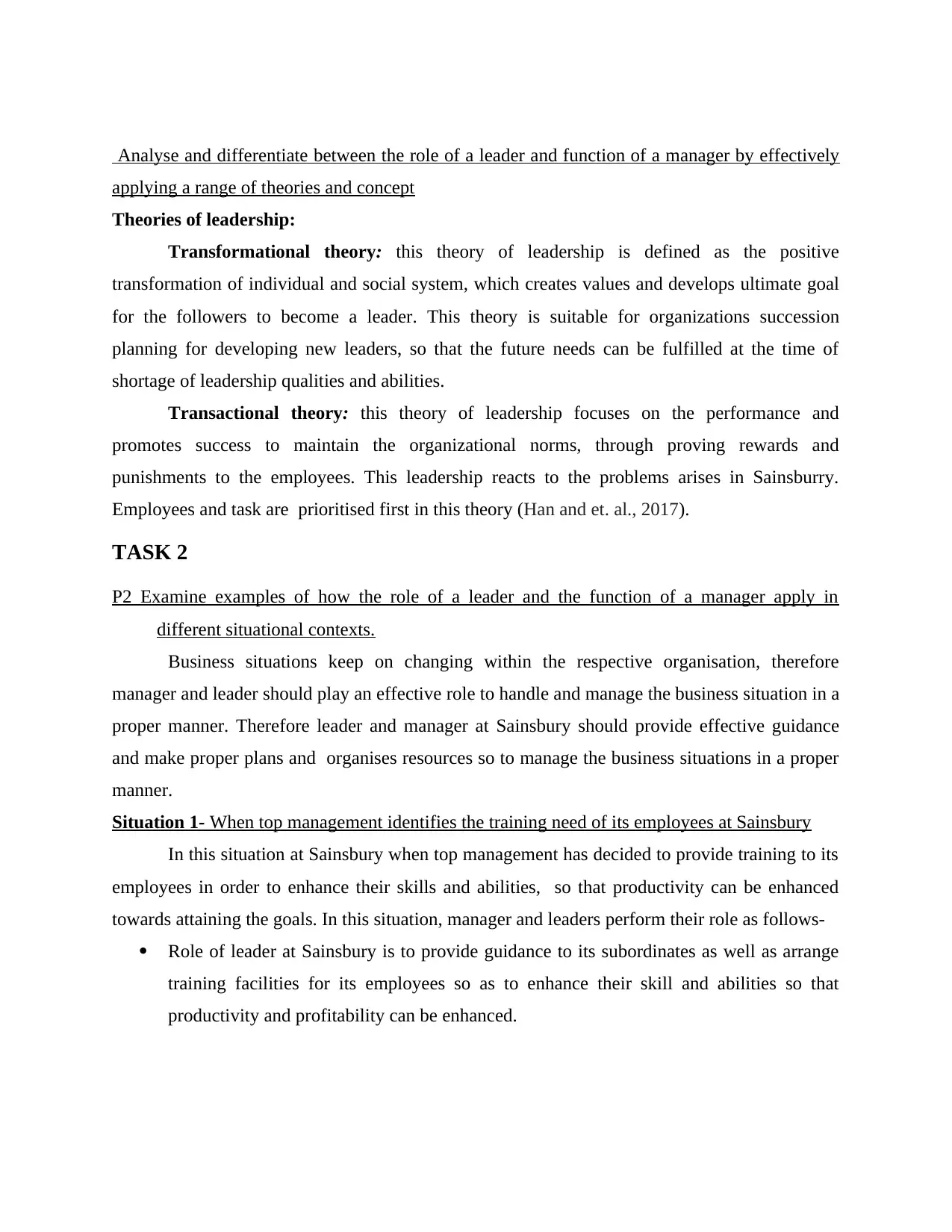
Analyse and differentiate between the role of a leader and function of a manager by effectively
applying a range of theories and concept
Theories of leadership:
Transformational theory: this theory of leadership is defined as the positive
transformation of individual and social system, which creates values and develops ultimate goal
for the followers to become a leader. This theory is suitable for organizations succession
planning for developing new leaders, so that the future needs can be fulfilled at the time of
shortage of leadership qualities and abilities.
Transactional theory: this theory of leadership focuses on the performance and
promotes success to maintain the organizational norms, through proving rewards and
punishments to the employees. This leadership reacts to the problems arises in Sainsburry.
Employees and task are prioritised first in this theory (Han and et. al., 2017).
TASK 2
P2 Examine examples of how the role of a leader and the function of a manager apply in
different situational contexts.
Business situations keep on changing within the respective organisation, therefore
manager and leader should play an effective role to handle and manage the business situation in a
proper manner. Therefore leader and manager at Sainsbury should provide effective guidance
and make proper plans and organises resources so to manage the business situations in a proper
manner.
Situation 1- When top management identifies the training need of its employees at Sainsbury
In this situation at Sainsbury when top management has decided to provide training to its
employees in order to enhance their skills and abilities, so that productivity can be enhanced
towards attaining the goals. In this situation, manager and leaders perform their role as follows-
Role of leader at Sainsbury is to provide guidance to its subordinates as well as arrange
training facilities for its employees so as to enhance their skill and abilities so that
productivity and profitability can be enhanced.
applying a range of theories and concept
Theories of leadership:
Transformational theory: this theory of leadership is defined as the positive
transformation of individual and social system, which creates values and develops ultimate goal
for the followers to become a leader. This theory is suitable for organizations succession
planning for developing new leaders, so that the future needs can be fulfilled at the time of
shortage of leadership qualities and abilities.
Transactional theory: this theory of leadership focuses on the performance and
promotes success to maintain the organizational norms, through proving rewards and
punishments to the employees. This leadership reacts to the problems arises in Sainsburry.
Employees and task are prioritised first in this theory (Han and et. al., 2017).
TASK 2
P2 Examine examples of how the role of a leader and the function of a manager apply in
different situational contexts.
Business situations keep on changing within the respective organisation, therefore
manager and leader should play an effective role to handle and manage the business situation in a
proper manner. Therefore leader and manager at Sainsbury should provide effective guidance
and make proper plans and organises resources so to manage the business situations in a proper
manner.
Situation 1- When top management identifies the training need of its employees at Sainsbury
In this situation at Sainsbury when top management has decided to provide training to its
employees in order to enhance their skills and abilities, so that productivity can be enhanced
towards attaining the goals. In this situation, manager and leaders perform their role as follows-
Role of leader at Sainsbury is to provide guidance to its subordinates as well as arrange
training facilities for its employees so as to enhance their skill and abilities so that
productivity and profitability can be enhanced.
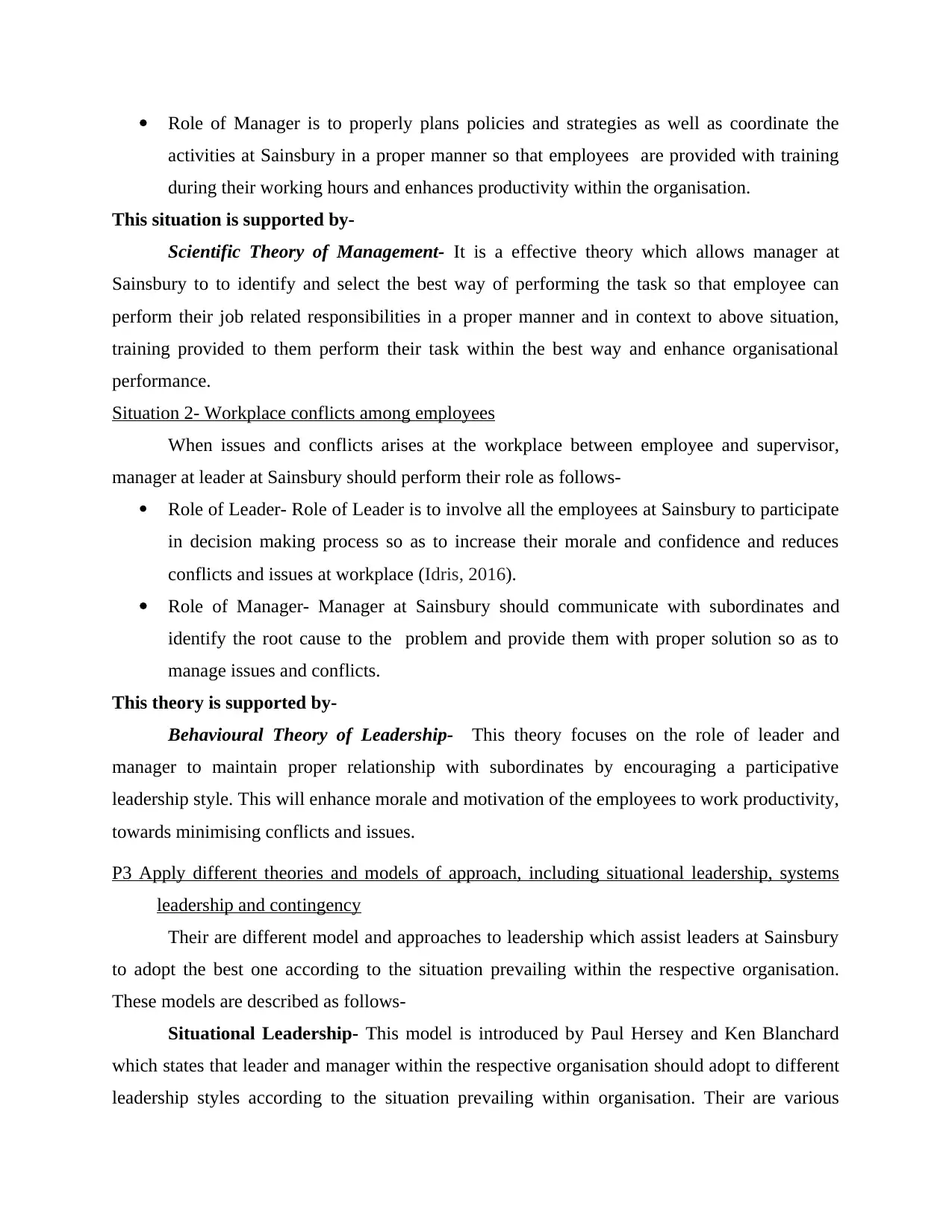
Role of Manager is to properly plans policies and strategies as well as coordinate the
activities at Sainsbury in a proper manner so that employees are provided with training
during their working hours and enhances productivity within the organisation.
This situation is supported by-
Scientific Theory of Management- It is a effective theory which allows manager at
Sainsbury to to identify and select the best way of performing the task so that employee can
perform their job related responsibilities in a proper manner and in context to above situation,
training provided to them perform their task within the best way and enhance organisational
performance.
Situation 2- Workplace conflicts among employees
When issues and conflicts arises at the workplace between employee and supervisor,
manager at leader at Sainsbury should perform their role as follows-
Role of Leader- Role of Leader is to involve all the employees at Sainsbury to participate
in decision making process so as to increase their morale and confidence and reduces
conflicts and issues at workplace (Idris, 2016).
Role of Manager- Manager at Sainsbury should communicate with subordinates and
identify the root cause to the problem and provide them with proper solution so as to
manage issues and conflicts.
This theory is supported by-
Behavioural Theory of Leadership- This theory focuses on the role of leader and
manager to maintain proper relationship with subordinates by encouraging a participative
leadership style. This will enhance morale and motivation of the employees to work productivity,
towards minimising conflicts and issues.
P3 Apply different theories and models of approach, including situational leadership, systems
leadership and contingency
Their are different model and approaches to leadership which assist leaders at Sainsbury
to adopt the best one according to the situation prevailing within the respective organisation.
These models are described as follows-
Situational Leadership- This model is introduced by Paul Hersey and Ken Blanchard
which states that leader and manager within the respective organisation should adopt to different
leadership styles according to the situation prevailing within organisation. Their are various
activities at Sainsbury in a proper manner so that employees are provided with training
during their working hours and enhances productivity within the organisation.
This situation is supported by-
Scientific Theory of Management- It is a effective theory which allows manager at
Sainsbury to to identify and select the best way of performing the task so that employee can
perform their job related responsibilities in a proper manner and in context to above situation,
training provided to them perform their task within the best way and enhance organisational
performance.
Situation 2- Workplace conflicts among employees
When issues and conflicts arises at the workplace between employee and supervisor,
manager at leader at Sainsbury should perform their role as follows-
Role of Leader- Role of Leader is to involve all the employees at Sainsbury to participate
in decision making process so as to increase their morale and confidence and reduces
conflicts and issues at workplace (Idris, 2016).
Role of Manager- Manager at Sainsbury should communicate with subordinates and
identify the root cause to the problem and provide them with proper solution so as to
manage issues and conflicts.
This theory is supported by-
Behavioural Theory of Leadership- This theory focuses on the role of leader and
manager to maintain proper relationship with subordinates by encouraging a participative
leadership style. This will enhance morale and motivation of the employees to work productivity,
towards minimising conflicts and issues.
P3 Apply different theories and models of approach, including situational leadership, systems
leadership and contingency
Their are different model and approaches to leadership which assist leaders at Sainsbury
to adopt the best one according to the situation prevailing within the respective organisation.
These models are described as follows-
Situational Leadership- This model is introduced by Paul Hersey and Ken Blanchard
which states that leader and manager within the respective organisation should adopt to different
leadership styles according to the situation prevailing within organisation. Their are various
Paraphrase This Document
Need a fresh take? Get an instant paraphrase of this document with our AI Paraphraser
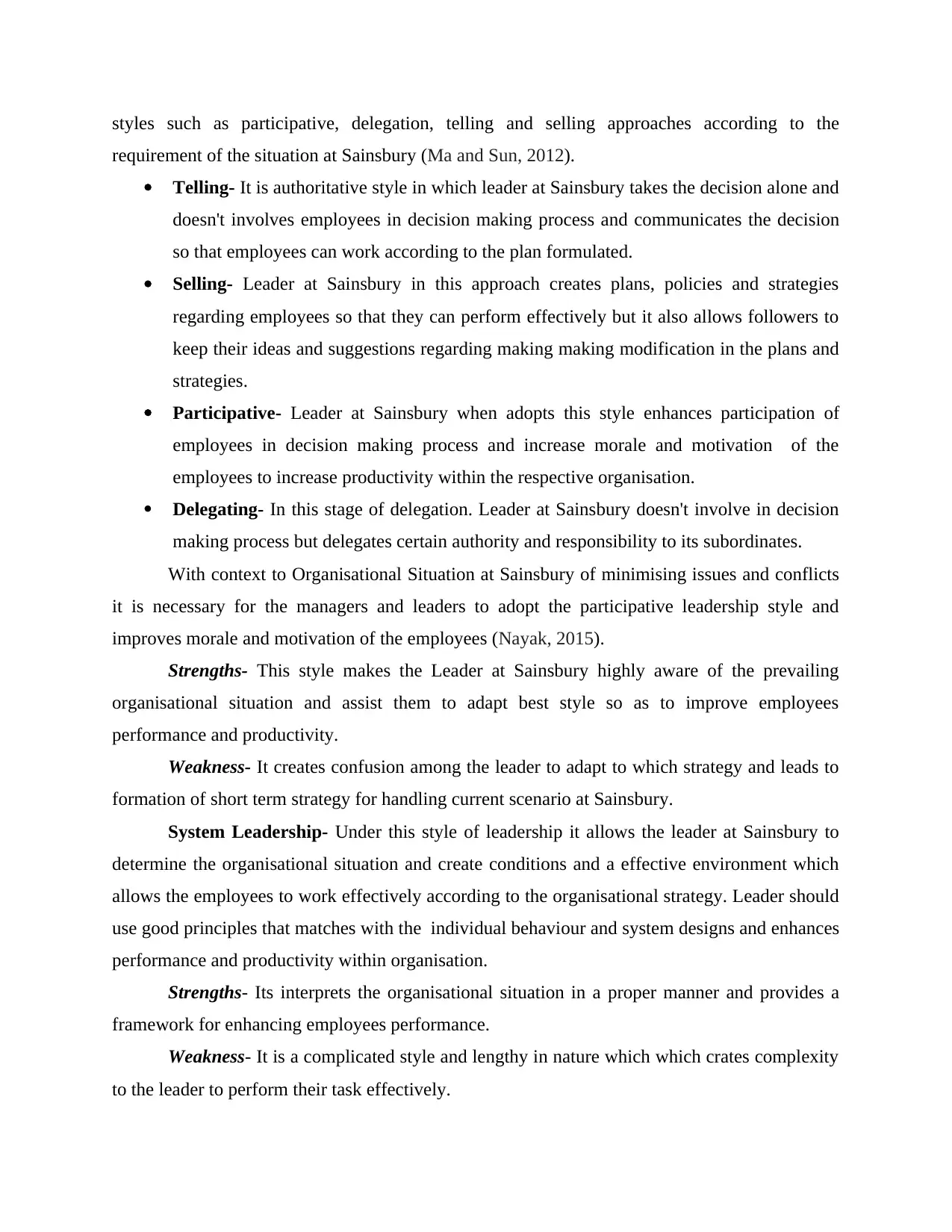
styles such as participative, delegation, telling and selling approaches according to the
requirement of the situation at Sainsbury (Ma and Sun, 2012).
Telling- It is authoritative style in which leader at Sainsbury takes the decision alone and
doesn't involves employees in decision making process and communicates the decision
so that employees can work according to the plan formulated.
Selling- Leader at Sainsbury in this approach creates plans, policies and strategies
regarding employees so that they can perform effectively but it also allows followers to
keep their ideas and suggestions regarding making making modification in the plans and
strategies.
Participative- Leader at Sainsbury when adopts this style enhances participation of
employees in decision making process and increase morale and motivation of the
employees to increase productivity within the respective organisation.
Delegating- In this stage of delegation. Leader at Sainsbury doesn't involve in decision
making process but delegates certain authority and responsibility to its subordinates.
With context to Organisational Situation at Sainsbury of minimising issues and conflicts
it is necessary for the managers and leaders to adopt the participative leadership style and
improves morale and motivation of the employees (Nayak, 2015).
Strengths- This style makes the Leader at Sainsbury highly aware of the prevailing
organisational situation and assist them to adapt best style so as to improve employees
performance and productivity.
Weakness- It creates confusion among the leader to adapt to which strategy and leads to
formation of short term strategy for handling current scenario at Sainsbury.
System Leadership- Under this style of leadership it allows the leader at Sainsbury to
determine the organisational situation and create conditions and a effective environment which
allows the employees to work effectively according to the organisational strategy. Leader should
use good principles that matches with the individual behaviour and system designs and enhances
performance and productivity within organisation.
Strengths- Its interprets the organisational situation in a proper manner and provides a
framework for enhancing employees performance.
Weakness- It is a complicated style and lengthy in nature which which crates complexity
to the leader to perform their task effectively.
requirement of the situation at Sainsbury (Ma and Sun, 2012).
Telling- It is authoritative style in which leader at Sainsbury takes the decision alone and
doesn't involves employees in decision making process and communicates the decision
so that employees can work according to the plan formulated.
Selling- Leader at Sainsbury in this approach creates plans, policies and strategies
regarding employees so that they can perform effectively but it also allows followers to
keep their ideas and suggestions regarding making making modification in the plans and
strategies.
Participative- Leader at Sainsbury when adopts this style enhances participation of
employees in decision making process and increase morale and motivation of the
employees to increase productivity within the respective organisation.
Delegating- In this stage of delegation. Leader at Sainsbury doesn't involve in decision
making process but delegates certain authority and responsibility to its subordinates.
With context to Organisational Situation at Sainsbury of minimising issues and conflicts
it is necessary for the managers and leaders to adopt the participative leadership style and
improves morale and motivation of the employees (Nayak, 2015).
Strengths- This style makes the Leader at Sainsbury highly aware of the prevailing
organisational situation and assist them to adapt best style so as to improve employees
performance and productivity.
Weakness- It creates confusion among the leader to adapt to which strategy and leads to
formation of short term strategy for handling current scenario at Sainsbury.
System Leadership- Under this style of leadership it allows the leader at Sainsbury to
determine the organisational situation and create conditions and a effective environment which
allows the employees to work effectively according to the organisational strategy. Leader should
use good principles that matches with the individual behaviour and system designs and enhances
performance and productivity within organisation.
Strengths- Its interprets the organisational situation in a proper manner and provides a
framework for enhancing employees performance.
Weakness- It is a complicated style and lengthy in nature which which crates complexity
to the leader to perform their task effectively.
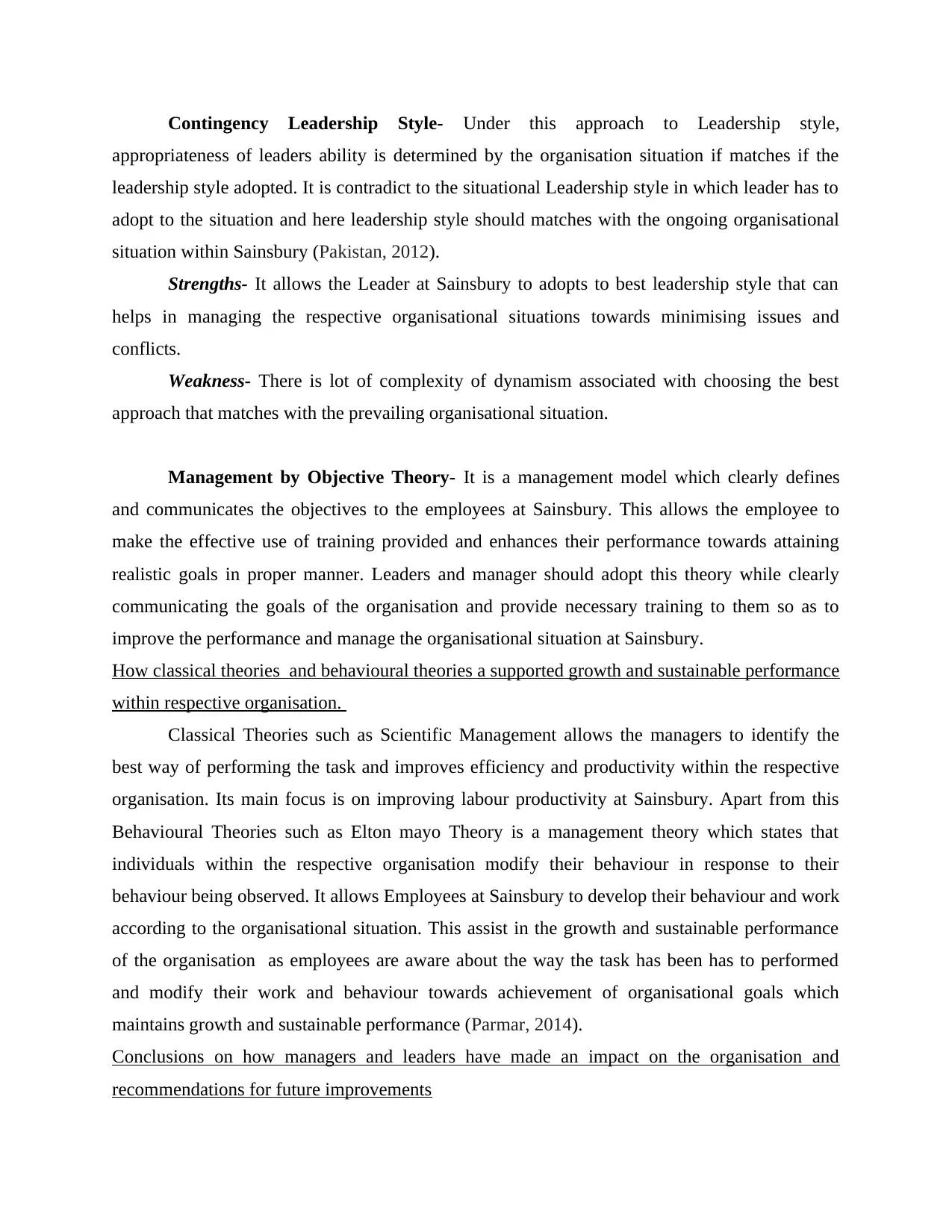
Contingency Leadership Style- Under this approach to Leadership style,
appropriateness of leaders ability is determined by the organisation situation if matches if the
leadership style adopted. It is contradict to the situational Leadership style in which leader has to
adopt to the situation and here leadership style should matches with the ongoing organisational
situation within Sainsbury (Pakistan, 2012).
Strengths- It allows the Leader at Sainsbury to adopts to best leadership style that can
helps in managing the respective organisational situations towards minimising issues and
conflicts.
Weakness- There is lot of complexity of dynamism associated with choosing the best
approach that matches with the prevailing organisational situation.
Management by Objective Theory- It is a management model which clearly defines
and communicates the objectives to the employees at Sainsbury. This allows the employee to
make the effective use of training provided and enhances their performance towards attaining
realistic goals in proper manner. Leaders and manager should adopt this theory while clearly
communicating the goals of the organisation and provide necessary training to them so as to
improve the performance and manage the organisational situation at Sainsbury.
How classical theories and behavioural theories a supported growth and sustainable performance
within respective organisation.
Classical Theories such as Scientific Management allows the managers to identify the
best way of performing the task and improves efficiency and productivity within the respective
organisation. Its main focus is on improving labour productivity at Sainsbury. Apart from this
Behavioural Theories such as Elton mayo Theory is a management theory which states that
individuals within the respective organisation modify their behaviour in response to their
behaviour being observed. It allows Employees at Sainsbury to develop their behaviour and work
according to the organisational situation. This assist in the growth and sustainable performance
of the organisation as employees are aware about the way the task has been has to performed
and modify their work and behaviour towards achievement of organisational goals which
maintains growth and sustainable performance (Parmar, 2014).
Conclusions on how managers and leaders have made an impact on the organisation and
recommendations for future improvements
appropriateness of leaders ability is determined by the organisation situation if matches if the
leadership style adopted. It is contradict to the situational Leadership style in which leader has to
adopt to the situation and here leadership style should matches with the ongoing organisational
situation within Sainsbury (Pakistan, 2012).
Strengths- It allows the Leader at Sainsbury to adopts to best leadership style that can
helps in managing the respective organisational situations towards minimising issues and
conflicts.
Weakness- There is lot of complexity of dynamism associated with choosing the best
approach that matches with the prevailing organisational situation.
Management by Objective Theory- It is a management model which clearly defines
and communicates the objectives to the employees at Sainsbury. This allows the employee to
make the effective use of training provided and enhances their performance towards attaining
realistic goals in proper manner. Leaders and manager should adopt this theory while clearly
communicating the goals of the organisation and provide necessary training to them so as to
improve the performance and manage the organisational situation at Sainsbury.
How classical theories and behavioural theories a supported growth and sustainable performance
within respective organisation.
Classical Theories such as Scientific Management allows the managers to identify the
best way of performing the task and improves efficiency and productivity within the respective
organisation. Its main focus is on improving labour productivity at Sainsbury. Apart from this
Behavioural Theories such as Elton mayo Theory is a management theory which states that
individuals within the respective organisation modify their behaviour in response to their
behaviour being observed. It allows Employees at Sainsbury to develop their behaviour and work
according to the organisational situation. This assist in the growth and sustainable performance
of the organisation as employees are aware about the way the task has been has to performed
and modify their work and behaviour towards achievement of organisational goals which
maintains growth and sustainable performance (Parmar, 2014).
Conclusions on how managers and leaders have made an impact on the organisation and
recommendations for future improvements
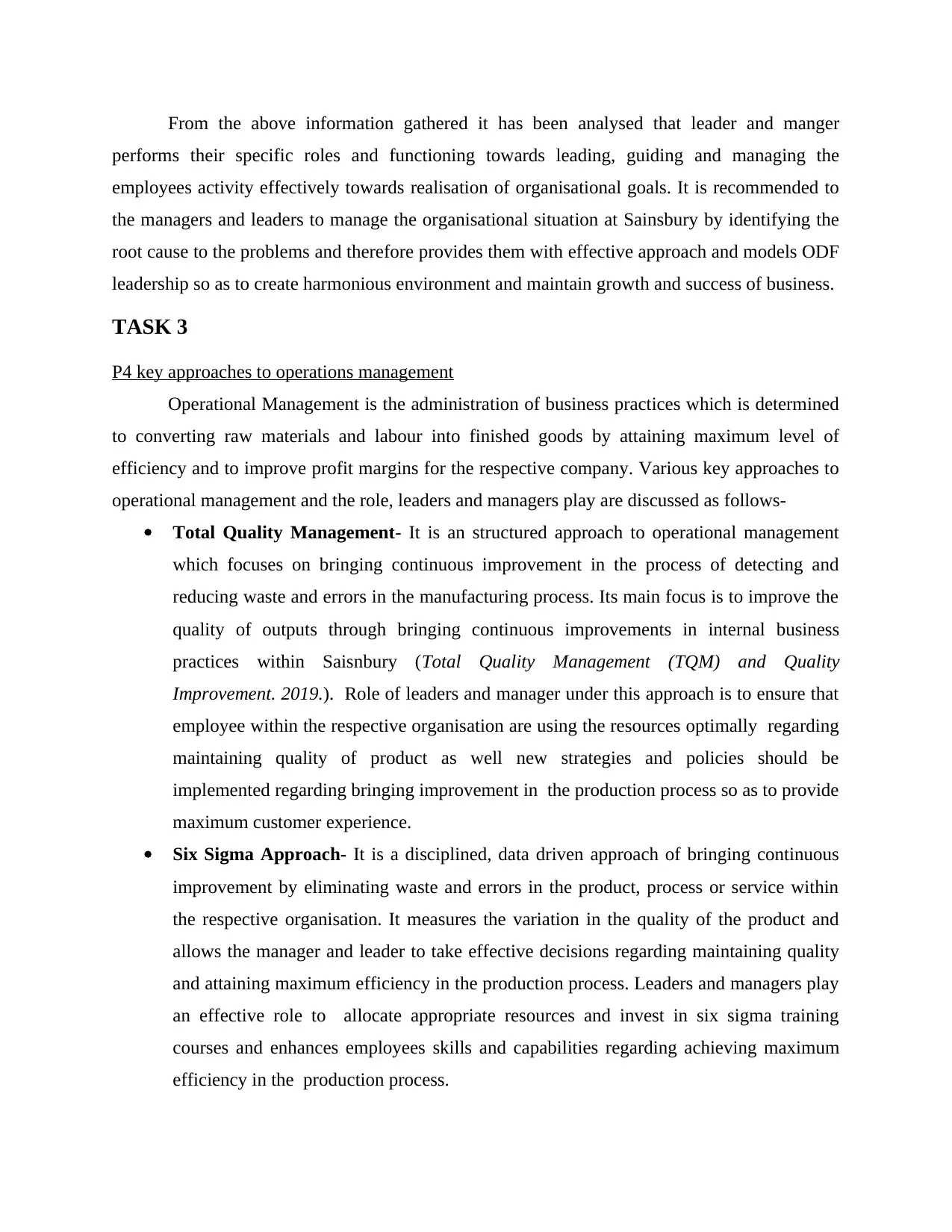
From the above information gathered it has been analysed that leader and manger
performs their specific roles and functioning towards leading, guiding and managing the
employees activity effectively towards realisation of organisational goals. It is recommended to
the managers and leaders to manage the organisational situation at Sainsbury by identifying the
root cause to the problems and therefore provides them with effective approach and models ODF
leadership so as to create harmonious environment and maintain growth and success of business.
TASK 3
P4 key approaches to operations management
Operational Management is the administration of business practices which is determined
to converting raw materials and labour into finished goods by attaining maximum level of
efficiency and to improve profit margins for the respective company. Various key approaches to
operational management and the role, leaders and managers play are discussed as follows-
Total Quality Management- It is an structured approach to operational management
which focuses on bringing continuous improvement in the process of detecting and
reducing waste and errors in the manufacturing process. Its main focus is to improve the
quality of outputs through bringing continuous improvements in internal business
practices within Saisnbury (Total Quality Management (TQM) and Quality
Improvement. 2019.). Role of leaders and manager under this approach is to ensure that
employee within the respective organisation are using the resources optimally regarding
maintaining quality of product as well new strategies and policies should be
implemented regarding bringing improvement in the production process so as to provide
maximum customer experience.
Six Sigma Approach- It is a disciplined, data driven approach of bringing continuous
improvement by eliminating waste and errors in the product, process or service within
the respective organisation. It measures the variation in the quality of the product and
allows the manager and leader to take effective decisions regarding maintaining quality
and attaining maximum efficiency in the production process. Leaders and managers play
an effective role to allocate appropriate resources and invest in six sigma training
courses and enhances employees skills and capabilities regarding achieving maximum
efficiency in the production process.
performs their specific roles and functioning towards leading, guiding and managing the
employees activity effectively towards realisation of organisational goals. It is recommended to
the managers and leaders to manage the organisational situation at Sainsbury by identifying the
root cause to the problems and therefore provides them with effective approach and models ODF
leadership so as to create harmonious environment and maintain growth and success of business.
TASK 3
P4 key approaches to operations management
Operational Management is the administration of business practices which is determined
to converting raw materials and labour into finished goods by attaining maximum level of
efficiency and to improve profit margins for the respective company. Various key approaches to
operational management and the role, leaders and managers play are discussed as follows-
Total Quality Management- It is an structured approach to operational management
which focuses on bringing continuous improvement in the process of detecting and
reducing waste and errors in the manufacturing process. Its main focus is to improve the
quality of outputs through bringing continuous improvements in internal business
practices within Saisnbury (Total Quality Management (TQM) and Quality
Improvement. 2019.). Role of leaders and manager under this approach is to ensure that
employee within the respective organisation are using the resources optimally regarding
maintaining quality of product as well new strategies and policies should be
implemented regarding bringing improvement in the production process so as to provide
maximum customer experience.
Six Sigma Approach- It is a disciplined, data driven approach of bringing continuous
improvement by eliminating waste and errors in the product, process or service within
the respective organisation. It measures the variation in the quality of the product and
allows the manager and leader to take effective decisions regarding maintaining quality
and attaining maximum efficiency in the production process. Leaders and managers play
an effective role to allocate appropriate resources and invest in six sigma training
courses and enhances employees skills and capabilities regarding achieving maximum
efficiency in the production process.
Secure Best Marks with AI Grader
Need help grading? Try our AI Grader for instant feedback on your assignments.
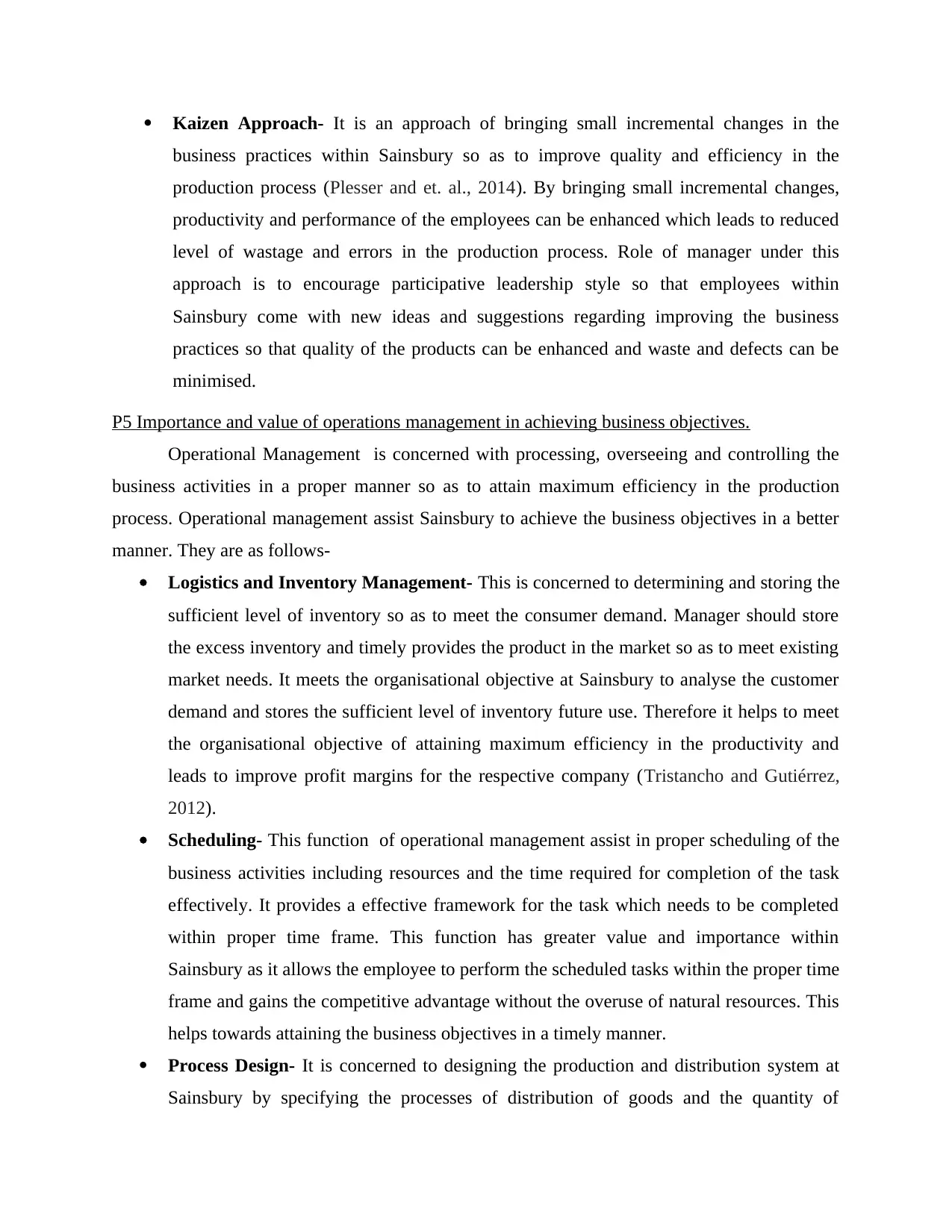
Kaizen Approach- It is an approach of bringing small incremental changes in the
business practices within Sainsbury so as to improve quality and efficiency in the
production process (Plesser and et. al., 2014). By bringing small incremental changes,
productivity and performance of the employees can be enhanced which leads to reduced
level of wastage and errors in the production process. Role of manager under this
approach is to encourage participative leadership style so that employees within
Sainsbury come with new ideas and suggestions regarding improving the business
practices so that quality of the products can be enhanced and waste and defects can be
minimised.
P5 Importance and value of operations management in achieving business objectives.
Operational Management is concerned with processing, overseeing and controlling the
business activities in a proper manner so as to attain maximum efficiency in the production
process. Operational management assist Sainsbury to achieve the business objectives in a better
manner. They are as follows-
Logistics and Inventory Management- This is concerned to determining and storing the
sufficient level of inventory so as to meet the consumer demand. Manager should store
the excess inventory and timely provides the product in the market so as to meet existing
market needs. It meets the organisational objective at Sainsbury to analyse the customer
demand and stores the sufficient level of inventory future use. Therefore it helps to meet
the organisational objective of attaining maximum efficiency in the productivity and
leads to improve profit margins for the respective company (Tristancho and Gutiérrez,
2012).
Scheduling- This function of operational management assist in proper scheduling of the
business activities including resources and the time required for completion of the task
effectively. It provides a effective framework for the task which needs to be completed
within proper time frame. This function has greater value and importance within
Sainsbury as it allows the employee to perform the scheduled tasks within the proper time
frame and gains the competitive advantage without the overuse of natural resources. This
helps towards attaining the business objectives in a timely manner.
Process Design- It is concerned to designing the production and distribution system at
Sainsbury by specifying the processes of distribution of goods and the quantity of
business practices within Sainsbury so as to improve quality and efficiency in the
production process (Plesser and et. al., 2014). By bringing small incremental changes,
productivity and performance of the employees can be enhanced which leads to reduced
level of wastage and errors in the production process. Role of manager under this
approach is to encourage participative leadership style so that employees within
Sainsbury come with new ideas and suggestions regarding improving the business
practices so that quality of the products can be enhanced and waste and defects can be
minimised.
P5 Importance and value of operations management in achieving business objectives.
Operational Management is concerned with processing, overseeing and controlling the
business activities in a proper manner so as to attain maximum efficiency in the production
process. Operational management assist Sainsbury to achieve the business objectives in a better
manner. They are as follows-
Logistics and Inventory Management- This is concerned to determining and storing the
sufficient level of inventory so as to meet the consumer demand. Manager should store
the excess inventory and timely provides the product in the market so as to meet existing
market needs. It meets the organisational objective at Sainsbury to analyse the customer
demand and stores the sufficient level of inventory future use. Therefore it helps to meet
the organisational objective of attaining maximum efficiency in the productivity and
leads to improve profit margins for the respective company (Tristancho and Gutiérrez,
2012).
Scheduling- This function of operational management assist in proper scheduling of the
business activities including resources and the time required for completion of the task
effectively. It provides a effective framework for the task which needs to be completed
within proper time frame. This function has greater value and importance within
Sainsbury as it allows the employee to perform the scheduled tasks within the proper time
frame and gains the competitive advantage without the overuse of natural resources. This
helps towards attaining the business objectives in a timely manner.
Process Design- It is concerned to designing the production and distribution system at
Sainsbury by specifying the processes of distribution of goods and the quantity of
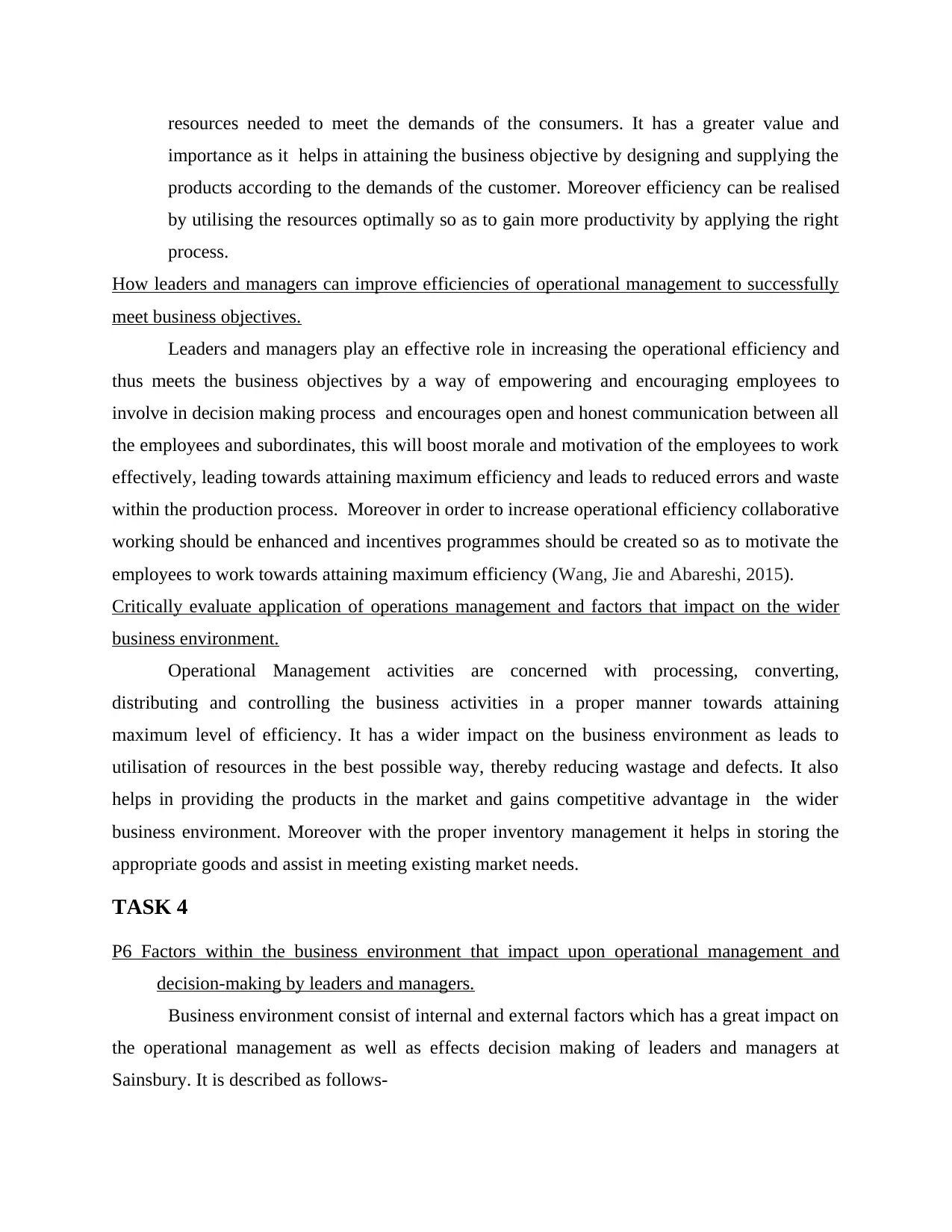
resources needed to meet the demands of the consumers. It has a greater value and
importance as it helps in attaining the business objective by designing and supplying the
products according to the demands of the customer. Moreover efficiency can be realised
by utilising the resources optimally so as to gain more productivity by applying the right
process.
How leaders and managers can improve efficiencies of operational management to successfully
meet business objectives.
Leaders and managers play an effective role in increasing the operational efficiency and
thus meets the business objectives by a way of empowering and encouraging employees to
involve in decision making process and encourages open and honest communication between all
the employees and subordinates, this will boost morale and motivation of the employees to work
effectively, leading towards attaining maximum efficiency and leads to reduced errors and waste
within the production process. Moreover in order to increase operational efficiency collaborative
working should be enhanced and incentives programmes should be created so as to motivate the
employees to work towards attaining maximum efficiency (Wang, Jie and Abareshi, 2015).
Critically evaluate application of operations management and factors that impact on the wider
business environment.
Operational Management activities are concerned with processing, converting,
distributing and controlling the business activities in a proper manner towards attaining
maximum level of efficiency. It has a wider impact on the business environment as leads to
utilisation of resources in the best possible way, thereby reducing wastage and defects. It also
helps in providing the products in the market and gains competitive advantage in the wider
business environment. Moreover with the proper inventory management it helps in storing the
appropriate goods and assist in meeting existing market needs.
TASK 4
P6 Factors within the business environment that impact upon operational management and
decision-making by leaders and managers.
Business environment consist of internal and external factors which has a great impact on
the operational management as well as effects decision making of leaders and managers at
Sainsbury. It is described as follows-
importance as it helps in attaining the business objective by designing and supplying the
products according to the demands of the customer. Moreover efficiency can be realised
by utilising the resources optimally so as to gain more productivity by applying the right
process.
How leaders and managers can improve efficiencies of operational management to successfully
meet business objectives.
Leaders and managers play an effective role in increasing the operational efficiency and
thus meets the business objectives by a way of empowering and encouraging employees to
involve in decision making process and encourages open and honest communication between all
the employees and subordinates, this will boost morale and motivation of the employees to work
effectively, leading towards attaining maximum efficiency and leads to reduced errors and waste
within the production process. Moreover in order to increase operational efficiency collaborative
working should be enhanced and incentives programmes should be created so as to motivate the
employees to work towards attaining maximum efficiency (Wang, Jie and Abareshi, 2015).
Critically evaluate application of operations management and factors that impact on the wider
business environment.
Operational Management activities are concerned with processing, converting,
distributing and controlling the business activities in a proper manner towards attaining
maximum level of efficiency. It has a wider impact on the business environment as leads to
utilisation of resources in the best possible way, thereby reducing wastage and defects. It also
helps in providing the products in the market and gains competitive advantage in the wider
business environment. Moreover with the proper inventory management it helps in storing the
appropriate goods and assist in meeting existing market needs.
TASK 4
P6 Factors within the business environment that impact upon operational management and
decision-making by leaders and managers.
Business environment consist of internal and external factors which has a great impact on
the operational management as well as effects decision making of leaders and managers at
Sainsbury. It is described as follows-
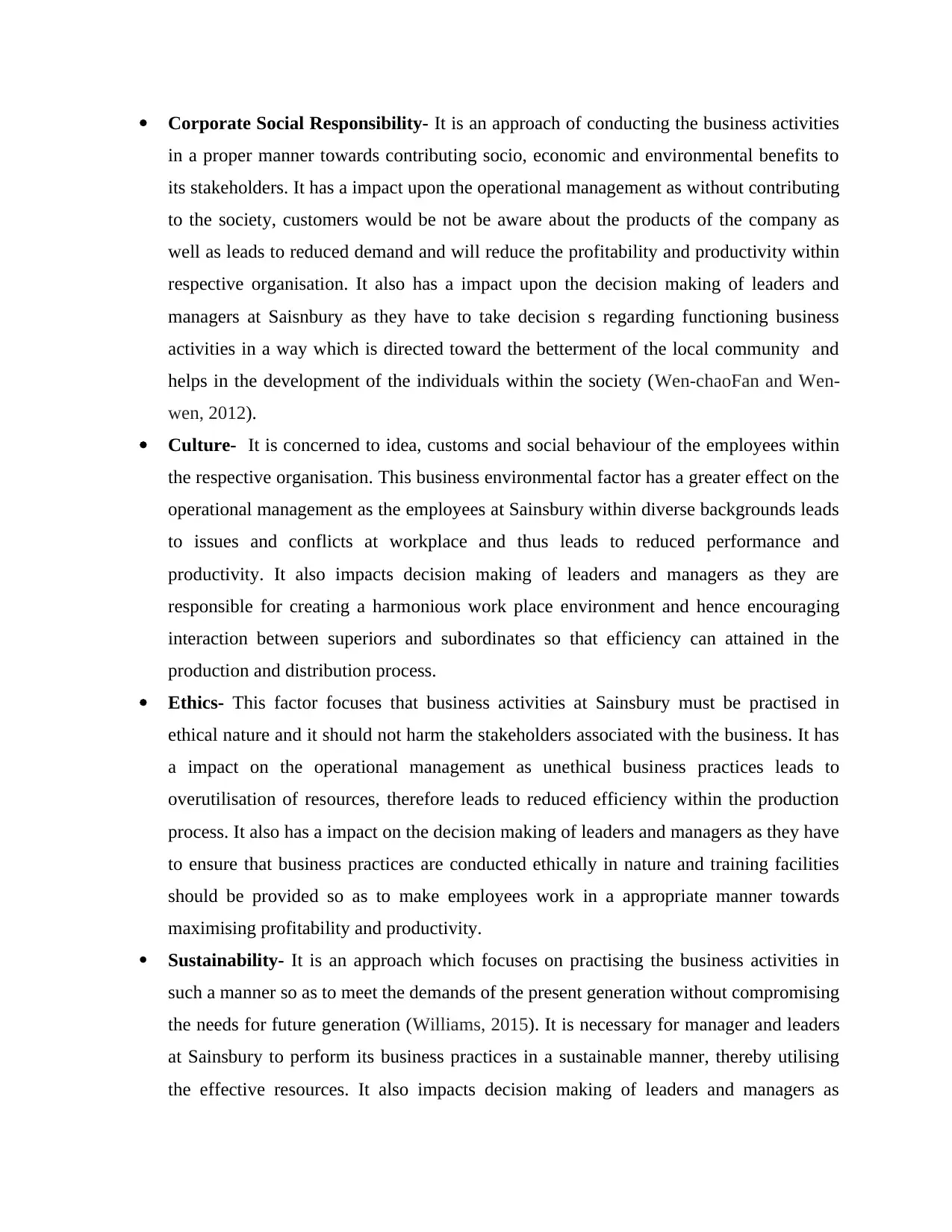
Corporate Social Responsibility- It is an approach of conducting the business activities
in a proper manner towards contributing socio, economic and environmental benefits to
its stakeholders. It has a impact upon the operational management as without contributing
to the society, customers would be not be aware about the products of the company as
well as leads to reduced demand and will reduce the profitability and productivity within
respective organisation. It also has a impact upon the decision making of leaders and
managers at Saisnbury as they have to take decision s regarding functioning business
activities in a way which is directed toward the betterment of the local community and
helps in the development of the individuals within the society (Wen-chaoFan and Wen-
wen, 2012).
Culture- It is concerned to idea, customs and social behaviour of the employees within
the respective organisation. This business environmental factor has a greater effect on the
operational management as the employees at Sainsbury within diverse backgrounds leads
to issues and conflicts at workplace and thus leads to reduced performance and
productivity. It also impacts decision making of leaders and managers as they are
responsible for creating a harmonious work place environment and hence encouraging
interaction between superiors and subordinates so that efficiency can attained in the
production and distribution process.
Ethics- This factor focuses that business activities at Sainsbury must be practised in
ethical nature and it should not harm the stakeholders associated with the business. It has
a impact on the operational management as unethical business practices leads to
overutilisation of resources, therefore leads to reduced efficiency within the production
process. It also has a impact on the decision making of leaders and managers as they have
to ensure that business practices are conducted ethically in nature and training facilities
should be provided so as to make employees work in a appropriate manner towards
maximising profitability and productivity.
Sustainability- It is an approach which focuses on practising the business activities in
such a manner so as to meet the demands of the present generation without compromising
the needs for future generation (Williams, 2015). It is necessary for manager and leaders
at Sainsbury to perform its business practices in a sustainable manner, thereby utilising
the effective resources. It also impacts decision making of leaders and managers as
in a proper manner towards contributing socio, economic and environmental benefits to
its stakeholders. It has a impact upon the operational management as without contributing
to the society, customers would be not be aware about the products of the company as
well as leads to reduced demand and will reduce the profitability and productivity within
respective organisation. It also has a impact upon the decision making of leaders and
managers at Saisnbury as they have to take decision s regarding functioning business
activities in a way which is directed toward the betterment of the local community and
helps in the development of the individuals within the society (Wen-chaoFan and Wen-
wen, 2012).
Culture- It is concerned to idea, customs and social behaviour of the employees within
the respective organisation. This business environmental factor has a greater effect on the
operational management as the employees at Sainsbury within diverse backgrounds leads
to issues and conflicts at workplace and thus leads to reduced performance and
productivity. It also impacts decision making of leaders and managers as they are
responsible for creating a harmonious work place environment and hence encouraging
interaction between superiors and subordinates so that efficiency can attained in the
production and distribution process.
Ethics- This factor focuses that business activities at Sainsbury must be practised in
ethical nature and it should not harm the stakeholders associated with the business. It has
a impact on the operational management as unethical business practices leads to
overutilisation of resources, therefore leads to reduced efficiency within the production
process. It also has a impact on the decision making of leaders and managers as they have
to ensure that business practices are conducted ethically in nature and training facilities
should be provided so as to make employees work in a appropriate manner towards
maximising profitability and productivity.
Sustainability- It is an approach which focuses on practising the business activities in
such a manner so as to meet the demands of the present generation without compromising
the needs for future generation (Williams, 2015). It is necessary for manager and leaders
at Sainsbury to perform its business practices in a sustainable manner, thereby utilising
the effective resources. It also impacts decision making of leaders and managers as
Paraphrase This Document
Need a fresh take? Get an instant paraphrase of this document with our AI Paraphraser
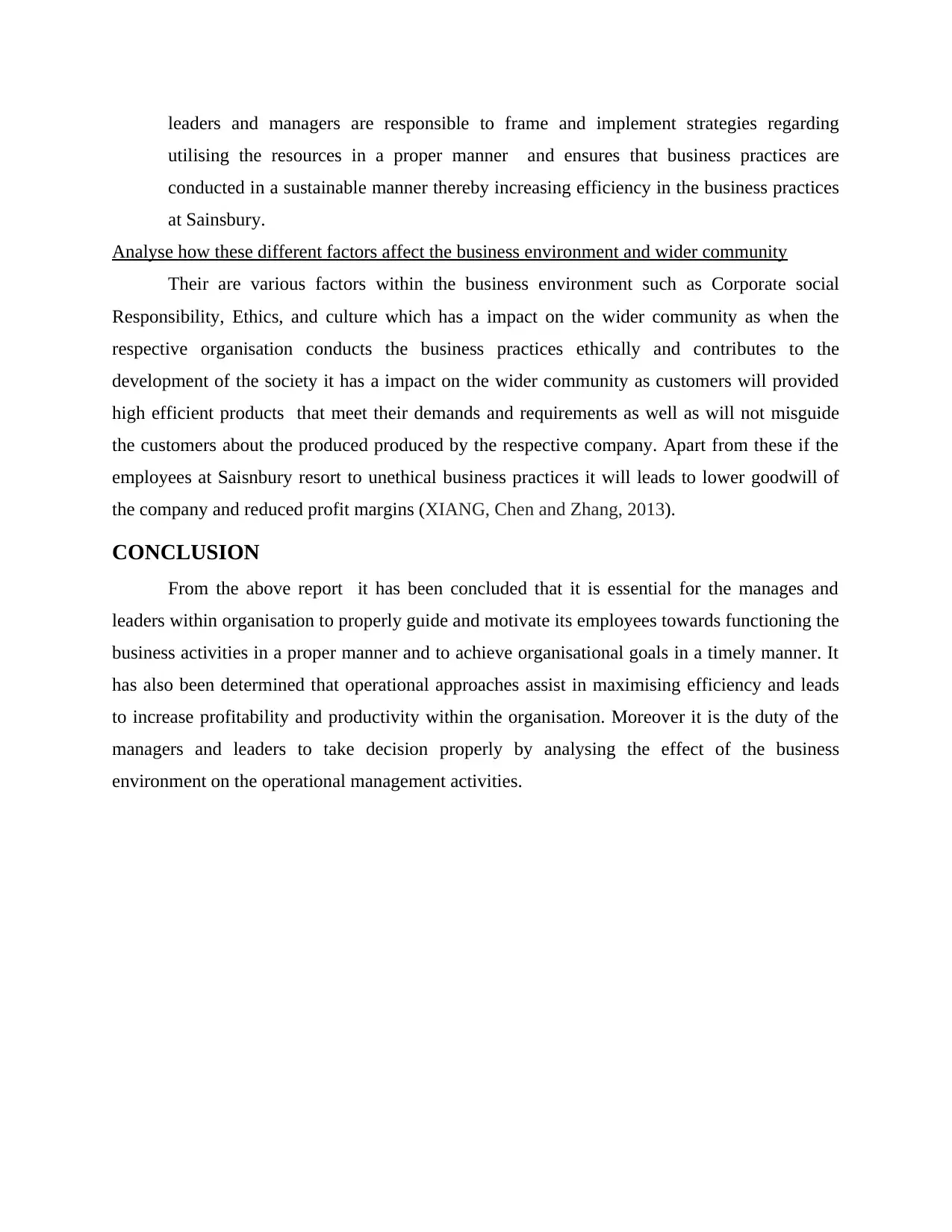
leaders and managers are responsible to frame and implement strategies regarding
utilising the resources in a proper manner and ensures that business practices are
conducted in a sustainable manner thereby increasing efficiency in the business practices
at Sainsbury.
Analyse how these different factors affect the business environment and wider community
Their are various factors within the business environment such as Corporate social
Responsibility, Ethics, and culture which has a impact on the wider community as when the
respective organisation conducts the business practices ethically and contributes to the
development of the society it has a impact on the wider community as customers will provided
high efficient products that meet their demands and requirements as well as will not misguide
the customers about the produced produced by the respective company. Apart from these if the
employees at Saisnbury resort to unethical business practices it will leads to lower goodwill of
the company and reduced profit margins (XIANG, Chen and Zhang, 2013).
CONCLUSION
From the above report it has been concluded that it is essential for the manages and
leaders within organisation to properly guide and motivate its employees towards functioning the
business activities in a proper manner and to achieve organisational goals in a timely manner. It
has also been determined that operational approaches assist in maximising efficiency and leads
to increase profitability and productivity within the organisation. Moreover it is the duty of the
managers and leaders to take decision properly by analysing the effect of the business
environment on the operational management activities.
utilising the resources in a proper manner and ensures that business practices are
conducted in a sustainable manner thereby increasing efficiency in the business practices
at Sainsbury.
Analyse how these different factors affect the business environment and wider community
Their are various factors within the business environment such as Corporate social
Responsibility, Ethics, and culture which has a impact on the wider community as when the
respective organisation conducts the business practices ethically and contributes to the
development of the society it has a impact on the wider community as customers will provided
high efficient products that meet their demands and requirements as well as will not misguide
the customers about the produced produced by the respective company. Apart from these if the
employees at Saisnbury resort to unethical business practices it will leads to lower goodwill of
the company and reduced profit margins (XIANG, Chen and Zhang, 2013).
CONCLUSION
From the above report it has been concluded that it is essential for the manages and
leaders within organisation to properly guide and motivate its employees towards functioning the
business activities in a proper manner and to achieve organisational goals in a timely manner. It
has also been determined that operational approaches assist in maximising efficiency and leads
to increase profitability and productivity within the organisation. Moreover it is the duty of the
managers and leaders to take decision properly by analysing the effect of the business
environment on the operational management activities.
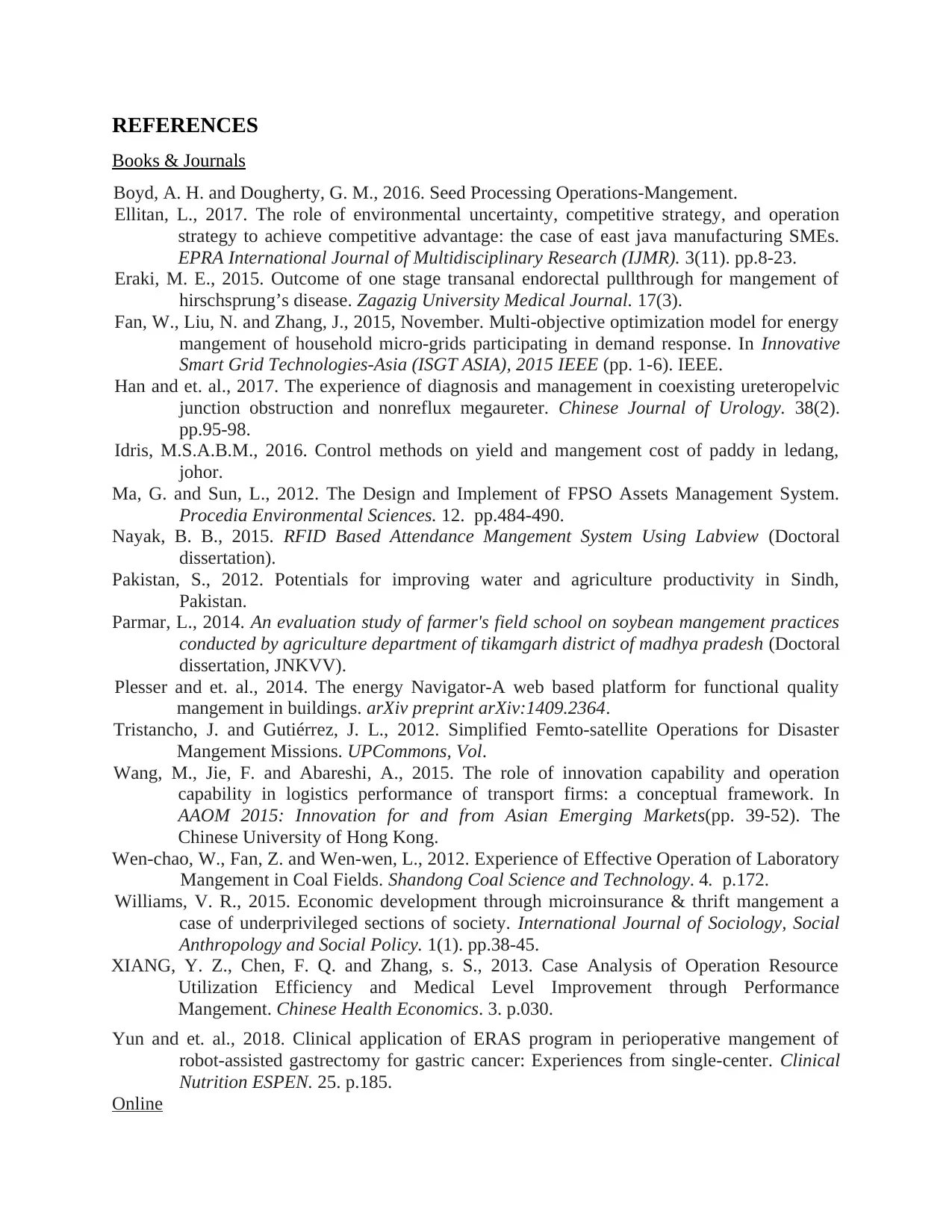
REFERENCES
Books & Journals
Boyd, A. H. and Dougherty, G. M., 2016. Seed Processing Operations-Mangement.
Ellitan, L., 2017. The role of environmental uncertainty, competitive strategy, and operation
strategy to achieve competitive advantage: the case of east java manufacturing SMEs.
EPRA International Journal of Multidisciplinary Research (IJMR). 3(11). pp.8-23.
Eraki, M. E., 2015. Outcome of one stage transanal endorectal pullthrough for mangement of
hirschsprung’s disease. Zagazig University Medical Journal. 17(3).
Fan, W., Liu, N. and Zhang, J., 2015, November. Multi-objective optimization model for energy
mangement of household micro-grids participating in demand response. In Innovative
Smart Grid Technologies-Asia (ISGT ASIA), 2015 IEEE (pp. 1-6). IEEE.
Han and et. al., 2017. The experience of diagnosis and management in coexisting ureteropelvic
junction obstruction and nonreflux megaureter. Chinese Journal of Urology. 38(2).
pp.95-98.
Idris, M.S.A.B.M., 2016. Control methods on yield and mangement cost of paddy in ledang,
johor.
Ma, G. and Sun, L., 2012. The Design and Implement of FPSO Assets Management System.
Procedia Environmental Sciences. 12. pp.484-490.
Nayak, B. B., 2015. RFID Based Attendance Mangement System Using Labview (Doctoral
dissertation).
Pakistan, S., 2012. Potentials for improving water and agriculture productivity in Sindh,
Pakistan.
Parmar, L., 2014. An evaluation study of farmer's field school on soybean mangement practices
conducted by agriculture department of tikamgarh district of madhya pradesh (Doctoral
dissertation, JNKVV).
Plesser and et. al., 2014. The energy Navigator-A web based platform for functional quality
mangement in buildings. arXiv preprint arXiv:1409.2364.
Tristancho, J. and Gutiérrez, J. L., 2012. Simplified Femto-satellite Operations for Disaster
Mangement Missions. UPCommons, Vol.
Wang, M., Jie, F. and Abareshi, A., 2015. The role of innovation capability and operation
capability in logistics performance of transport firms: a conceptual framework. In
AAOM 2015: Innovation for and from Asian Emerging Markets(pp. 39-52). The
Chinese University of Hong Kong.
Wen-chao, W., Fan, Z. and Wen-wen, L., 2012. Experience of Effective Operation of Laboratory
Mangement in Coal Fields. Shandong Coal Science and Technology. 4. p.172.
Williams, V. R., 2015. Economic development through microinsurance & thrift mangement a
case of underprivileged sections of society. International Journal of Sociology, Social
Anthropology and Social Policy. 1(1). pp.38-45.
XIANG, Y. Z., Chen, F. Q. and Zhang, s. S., 2013. Case Analysis of Operation Resource
Utilization Efficiency and Medical Level Improvement through Performance
Mangement. Chinese Health Economics. 3. p.030.
Yun and et. al., 2018. Clinical application of ERAS program in perioperative mangement of
robot-assisted gastrectomy for gastric cancer: Experiences from single-center. Clinical
Nutrition ESPEN. 25. p.185.
Online
Books & Journals
Boyd, A. H. and Dougherty, G. M., 2016. Seed Processing Operations-Mangement.
Ellitan, L., 2017. The role of environmental uncertainty, competitive strategy, and operation
strategy to achieve competitive advantage: the case of east java manufacturing SMEs.
EPRA International Journal of Multidisciplinary Research (IJMR). 3(11). pp.8-23.
Eraki, M. E., 2015. Outcome of one stage transanal endorectal pullthrough for mangement of
hirschsprung’s disease. Zagazig University Medical Journal. 17(3).
Fan, W., Liu, N. and Zhang, J., 2015, November. Multi-objective optimization model for energy
mangement of household micro-grids participating in demand response. In Innovative
Smart Grid Technologies-Asia (ISGT ASIA), 2015 IEEE (pp. 1-6). IEEE.
Han and et. al., 2017. The experience of diagnosis and management in coexisting ureteropelvic
junction obstruction and nonreflux megaureter. Chinese Journal of Urology. 38(2).
pp.95-98.
Idris, M.S.A.B.M., 2016. Control methods on yield and mangement cost of paddy in ledang,
johor.
Ma, G. and Sun, L., 2012. The Design and Implement of FPSO Assets Management System.
Procedia Environmental Sciences. 12. pp.484-490.
Nayak, B. B., 2015. RFID Based Attendance Mangement System Using Labview (Doctoral
dissertation).
Pakistan, S., 2012. Potentials for improving water and agriculture productivity in Sindh,
Pakistan.
Parmar, L., 2014. An evaluation study of farmer's field school on soybean mangement practices
conducted by agriculture department of tikamgarh district of madhya pradesh (Doctoral
dissertation, JNKVV).
Plesser and et. al., 2014. The energy Navigator-A web based platform for functional quality
mangement in buildings. arXiv preprint arXiv:1409.2364.
Tristancho, J. and Gutiérrez, J. L., 2012. Simplified Femto-satellite Operations for Disaster
Mangement Missions. UPCommons, Vol.
Wang, M., Jie, F. and Abareshi, A., 2015. The role of innovation capability and operation
capability in logistics performance of transport firms: a conceptual framework. In
AAOM 2015: Innovation for and from Asian Emerging Markets(pp. 39-52). The
Chinese University of Hong Kong.
Wen-chao, W., Fan, Z. and Wen-wen, L., 2012. Experience of Effective Operation of Laboratory
Mangement in Coal Fields. Shandong Coal Science and Technology. 4. p.172.
Williams, V. R., 2015. Economic development through microinsurance & thrift mangement a
case of underprivileged sections of society. International Journal of Sociology, Social
Anthropology and Social Policy. 1(1). pp.38-45.
XIANG, Y. Z., Chen, F. Q. and Zhang, s. S., 2013. Case Analysis of Operation Resource
Utilization Efficiency and Medical Level Improvement through Performance
Mangement. Chinese Health Economics. 3. p.030.
Yun and et. al., 2018. Clinical application of ERAS program in perioperative mangement of
robot-assisted gastrectomy for gastric cancer: Experiences from single-center. Clinical
Nutrition ESPEN. 25. p.185.
Online
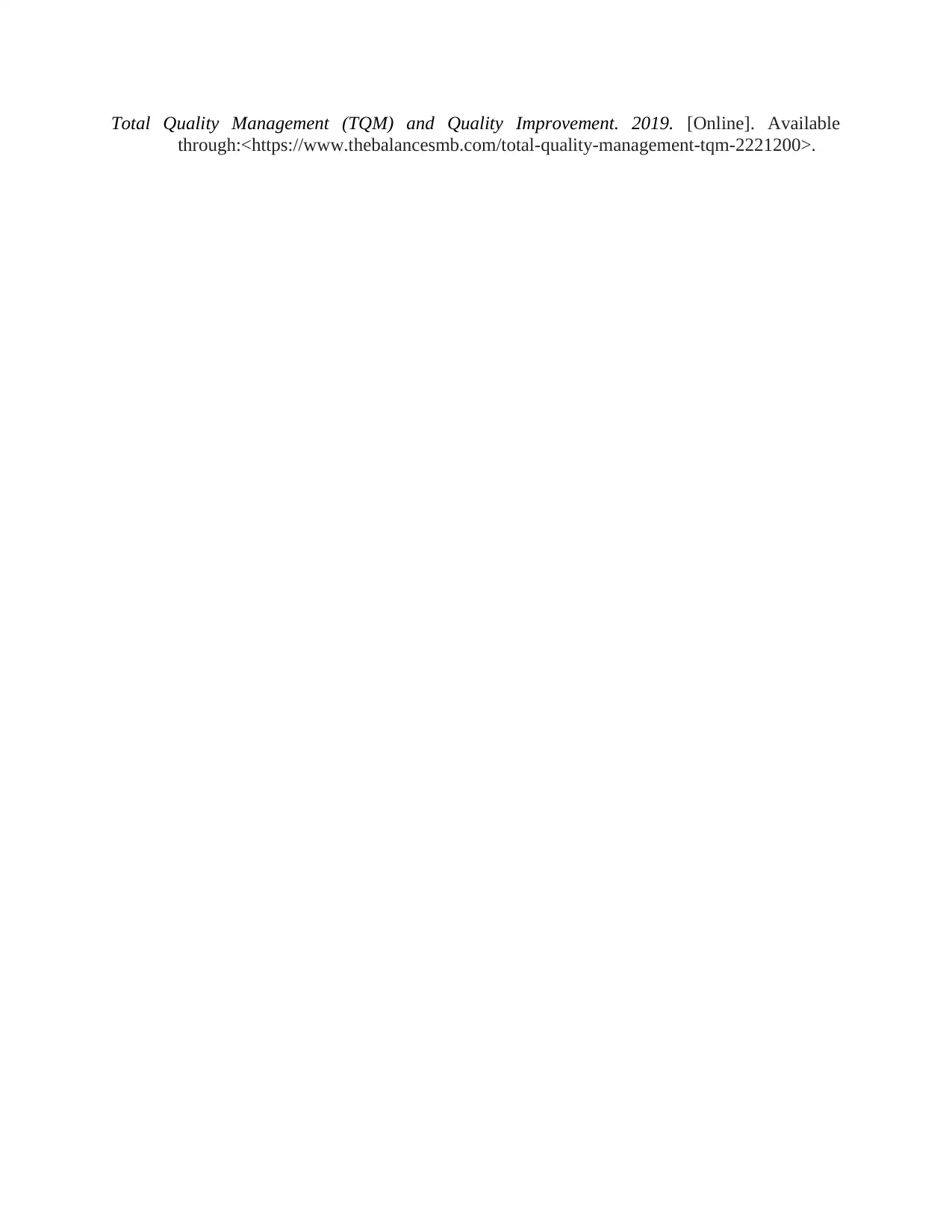
Total Quality Management (TQM) and Quality Improvement. 2019. [Online]. Available
through:<https://www.thebalancesmb.com/total-quality-management-tqm-2221200>.
through:<https://www.thebalancesmb.com/total-quality-management-tqm-2221200>.
1 out of 16
Your All-in-One AI-Powered Toolkit for Academic Success.
+13062052269
info@desklib.com
Available 24*7 on WhatsApp / Email
![[object Object]](/_next/static/media/star-bottom.7253800d.svg)
Unlock your academic potential
© 2024 | Zucol Services PVT LTD | All rights reserved.





